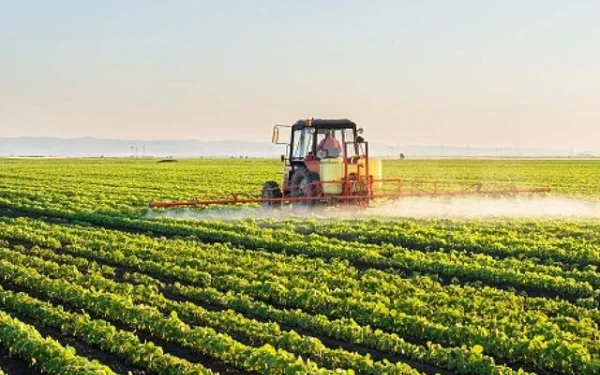Introduction: A Leap Toward Technological Agriculture
Islamabad – In a major step toward modernizing its agriculture sector and addressing climate challenges, Pakistan has officially launched the “Precision Agriculture” initiative with the support of the Special Investment Facilitation Council (SIFC). This innovative program is set to transform traditional farming practices using cutting-edge technologies such as GPS-guided systems, drones, and automated equipment, with the goal of increasing productivity, ensuring sustainability, and mitigating the impacts of climate change.
The project is part of a larger national effort to make the agricultural economy climate-resilient, sustainable, and technologically advanced. The first phase of this transformative program is being rolled out in Punjab and Gilgit-Baltistan, two regions crucial to Pakistan’s overall agricultural output and food security.
What is Precision Agriculture?
Precision Agriculture (PA) refers to the use of advanced technologies and data analytics to optimize field-level management regarding crop farming. Instead of relying on one-size-fits-all practices, precision farming uses location-specific data to make accurate decisions related to irrigation, fertilization, pest control, and harvesting.
Key tools involved in precision agriculture include:
- Global Positioning Systems (GPS) for tracking and mapping fields.
- Remote sensing and drone technology for real-time monitoring of crops.
- Automated machinery for planting, spraying, and harvesting.
- Data analytics and AI-powered software for predictive insights.
By tailoring actions to specific conditions, precision agriculture helps reduce waste, improve yields, and make farming more environmentally sustainable.
The Role of SIFC in Agriculture Transformation
The Special Investment Facilitation Council (SIFC) is playing a vital role in overseeing the implementation and coordination of this initiative. Established to streamline foreign and domestic investments in key sectors, SIFC has prioritized agriculture modernization as a national security and economic growth imperative.
SIFC is not only supporting the policy framework for precision agriculture but is also engaging with:
- International donors and financial institutions, such as the Green Climate Fund (GCF).
- Academic and research institutions, including the University of Agriculture, Faisalabad.
- Private sector stakeholders in agritech and sustainable farming solutions.
This strategic partnership model aims to create a knowledge-based, technology-driven farming ecosystem in Pakistan.
Knowledge Management Center at Faisalabad Agriculture University
A core component of this project is the central Knowledge Management system launched at the University of Agriculture in Faisalabad, one of the country’s leading agricultural research institutions.
This center will:
- Gather and analyze data from pilot farms.
- Train farmers and extension workers on modern agricultural technologies.
- Serve as a hub for innovation, research, and capacity-building in smart agriculture.
- Promote climate-adaptive strategies, such as optimized irrigation, soil health management, and pest forecasting.
The Knowledge Center is envisioned as the brain of the project, responsible for shaping evidence-based policies and supporting farmers with real-time insights and best practices.
Green Climate Fund (GCF): Supporting Climate-Smart Agriculture
The Green Climate Fund (GCF), established under the United Nations Framework Convention on Climate Change (UNFCCC), is providing technical and financial support for the precision agriculture project.
The GCF’s involvement underscores the environmental and climate-related importance of the initiative. Pakistan, being one of the most vulnerable countries to climate change, especially in agriculture, sees this collaboration as a pathway to:
- Reduce greenhouse gas (GHG) emissions through efficient use of water and fertilizers.
- Promote carbon sequestration through regenerative agriculture.
- Improve resilience to floods, droughts, and heatwaves by developing adaptive farming systems.
By aligning with GCF’s climate objectives, the project enhances Pakistan’s international credibility on sustainability and environmental protection.
Initial Focus Areas: Punjab and Gilgit-Baltistan
The first phase of the Precision Agriculture project targets Punjab and Gilgit-Baltistan, both agriculturally significant and climatically diverse.
Punjab: The Food Basket of Pakistan
- Produces the majority of wheat, rice, sugarcane, and cotton in the country.
- Faces water scarcity, soil degradation, and declining productivity due to over-farming.
- Will benefit from efficient irrigation systems, precision nutrient management, and automated machinery to cut costs and increase yields.
Gilgit-Baltistan: Climate-Sensitive and Untapped Potential
- Known for its organic fruits, nuts, and medicinal herbs.
- Highly vulnerable to glacial melt, landslides, and short growing seasons.
- Precision tools like drone-based terrain mapping and early warning systems will help farmers adapt to changing climate conditions.
Technology to Be Deployed: Farming Gets Smarter
A range of modern agricultural tools will be implemented in the field, including:
1. GPS-Guided Equipment
- Enables accurate field navigation for sowing and harvesting.
- Reduces overlapping of resources, conserving fuel, seeds, and fertilizers.
2. Drones
- Used for aerial surveillance, crop health monitoring, and pesticide spraying.
- Can cover vast areas quickly and identify diseases or pest infestations early.
3. Remote Sensors and IoT Devices
- Monitor soil moisture, weather conditions, and crop growth stages in real-time.
- Allow for precision irrigation and fertilizer application.
4. Artificial Intelligence (AI) & Data Analytics
- Analyzes patterns in soil, crop performance, and climate trends.
- Provides farmers with predictive models and decision support systems.
Benefits for Farmers and the Economy
The Precision Agriculture initiative is expected to bring multiple benefits for farmers, consumers, and the national economy:
- Higher Yields: Better resource management can increase productivity by 20–30%.
- Cost Efficiency: Automation reduces labor and input costs.
- Climate Resilience: Adaptive practices will help manage unpredictable weather patterns.
- Job Creation: The agritech sector will create opportunities for skilled workers in rural areas.
- Export Growth: Higher quality produce can meet international standards and increase agro-export revenues.
Challenges Ahead
Despite its promise, the initiative faces several challenges:
- Digital literacy among farmers is low, requiring extensive training programs.
- Upfront costs of precision equipment may be prohibitive for smallholders.
- Infrastructure gaps such as lack of rural internet connectivity could hinder data transmission.
- Need for policy reforms to support the private sector’s role in scaling up the technology.
To tackle these, the government is expected to introduce subsidy schemes, financing programs, and partnerships with tech companies.
Conclusion: Toward a Greener and Smarter Future
The launch of the Precision Agriculture initiative in Pakistan represents a turning point in the nation’s farming history. By embracing technology and sustainable practices, the country is moving toward a more productive, climate-resilient, and economically viable agricultural model.
With the backing of the SIFC, the University of Agriculture Faisalabad, and international partners like GCF, Pakistan is paving the way for green innovation in agriculture.
If successful, this model could be expanded nationwide and potentially serve as a regional benchmark for modern agriculture in South Asia.

























